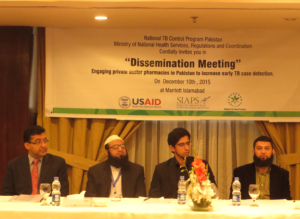
A 2010 prevalence survey in Pakistan showed that the rate of bacteriologically confirmed pulmonary TB among the adult population is very high. Case detection is important for TB control, allowing service providers to identify sources of infection and treat them to break the chain of infection in a community. For this reason, low TB case detection is often identified as one of the most important barriers to improving TB care. Among adults over 15 years in Pakistan, there is an overall case detection rate of 45.4%—much lower than the WHO goal of 70%—suggesting that a high proportion of cases that present in the community are being missed and indicates that people may not be aware of the symptoms of TB and the presence of diagnostic and treatment services. Additionally, a higher prevalence of TB cases in males as compared to females (365 versus 246 per 100,000 population), further implies that TB care needs to be expanded to the private sector, since public facilities currently offer services only in the morning hours, which is a challenge for the predominantly male working population.
In Pakistan, the private sector caters to about 70% of the primary health care needs of the population. Previously, the 65,535 registered pharmacies in the country were not engaged in TB control or preventive activities. To engage the retail pharmacies in TB control, the National TB Program (NTP) partnered with the USAID-funded Systems for Improved Access to Pharmaceuticals and Services (SIAPS) Program to pilot an intervention targeting the retail pharmaceutical sector in TB management.
Download this article as a PDF
From Analysis to Action: Using Tools to Inform Interventions in the Private Sector
In August 2012 the NTP, together with SIAPS and Punjab and Peshawar University College of Pharmacies, conducted a baseline study assessing the knowledge and practices in TB case management in the retail pharmaceutical sector in Islamabad, Rawalpindi, Lahore and Peshawar cities. Findings showed that out of 129 pharmacies surveyed, 78% acknowledged seeing clients with TB symptoms at their store.
Additionally, 78% of pharmacists had never heard of the NTP, and nearly 90% were not aware of drug-resistant forms of TB and the directly observed treatment short course (DOTS) method. Moreover, 98% of respondents had not received any training on TB in the previous two years.
In July 2013, study findings were presented to higher-level national stakeholders, who recommended that SIAPS, in close collaboration with the NTP, should pilot an intervention to engage retail pharmacies in six major cities. SIAPS provided technical and financial assistance to the NTP in implementing this pilot by developing training materials for dispensers in pharmacies and conducted training of trainers to train 26 master trainers. In total, about 500 pharmacies in Lahore, Rawalpindi, Islamabad, Sukkur, Karachi, and Peshawar were engaged as a part of the pilot and 276 actively participated.
Additionally, reporting tools for recording patient data and establishing effective referral systems were developed and adapted by SIAPS from NTP reporting tools to suit private-sector needs. Directories were developed, and printed copies were placed at participating pharmacies for easy reference.
A Successful Pilot and National Scale-up:
Results from the pilot have shown that establishing a mechanism to refer patients from private drug outlets to TB diagnostic facilities, combined with enhancing dispensers’ TB symptoms knowledge and providing the necessary tools, expands the reach of NTPs and has the potential to significantly increase TB case finding.
- About 1,007 clients with TB-like symptoms were identified and referred from pharmacies to TB treatment and diagnostic centers
- 77% of referred clients were traceable and aware of their test results
- 18% of patients had sputum smears that tested positive for TB and were notified to the NTP—a high amount that indicates a delay in seeking care
- The Rawalpindi and Lahore districts had the highest number of participating pharmacies, and contributed to the identification of 72% of all early smear-positive TB cases
Through the pilot, SIAPS technical staff and partners learned that an innovative and flexible training methodology is key to meet the needs of private pharmacies. It also became clear that close follow-up with pharmacies is required, but challenging. In addition, forming partnerships with pharmacy schools for TB control is feasible and a promising sustainable model for future PPM in Pakistan.
On December 10, 2015, a national-level dissemination meeting was held with 25 participants from donor agencies, the NTP, implementing partners, and a pharmacy school. As a result of the pilot and this meeting, SIAPS supported the NTP in the development of a concept note and tentative budget to submit to the Global Fund to expand the project to a national scale.
Read more about the pilot on the Pakistan NTP website here.

